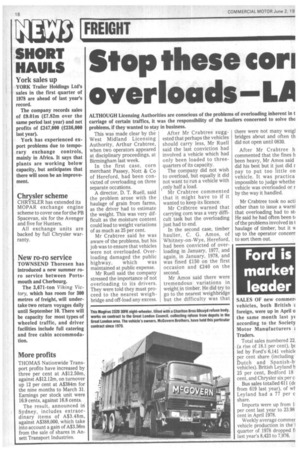Stop these con overloads LA
Page 20

If you've noticed an error in this article please click here to report it so we can fix it.
ALTHOUGH Licensing Authorities are conscious of the problems of overloading inherent in t carriage of certain traffics, it was the responsibility of the hauliers concerned to solve the problems, if they wanted to stay in business.
This was made clear by the West Midland Licensing Authority, Arthur Crabtree, when two operators appeared at disciplinary proceedings, at Birmingham last week.
In the first case, corn merchant Passey, Nott & Co of Hereford, had been convicted of overloading on three separate occasions.
A director, D. T. Rue11, said the problem arose with the haulage of grain from farms, as the driver had to estimate the weight. This was very difficult as the moisture content could lead to weight variations of as much as 25 per cent.
Mr Crabtree said he was aware of the problems, but his job was to ensure that vehicles were not overloaded. Overloading damaged the public highway, which was maintained at public expense.
Mr RueII said the company stressed the importance of not overloading to its drivers. They were told they must proceed to the nearest weighbridge and off-load any excess. After Mr Crabtree suggested that perhaps the vehicles should carry less, Mr Rue11 said the last conviction had involved a vehicle which had only been loaded to threequarters of its capacity. The company did not wish to overload, but equally it did not want to run a vehicle with only half a load.
Mr Crabtree commented . that it might have to if it wanted to keep its licence.
Mr Crabtree warned that carrying corn was a very difficult task but the overloading just had to end.
In the second case, timber haulier, C. G. Amos, of 'Whitney-on-Wye, Hereford, had been convicted of overloading in January, 1977, and again, in January, 1978, and was fined £150 on the first occasion and £240 on the second.
Mr Amos said there were tremendous variations in weight in timber. He did try to go to the nearest weighbridge but the difficulty was that there were not many weigl bridges about and often th did not open until 0830.
After Mr Crabtree h commented that the fines h been heavy, Mr Amos said did his best but it just did r pay to put too little on vehicle. It was practica impossible to judge whethe vehicle was overloaded or r by the way it handled.
Mr Crabtree took no acti other than to issue a warni that overloading had to st( He said he had often been t( of the problems involved in t haulage of timber; but it up to the operator concern to sort them out.








































































































































